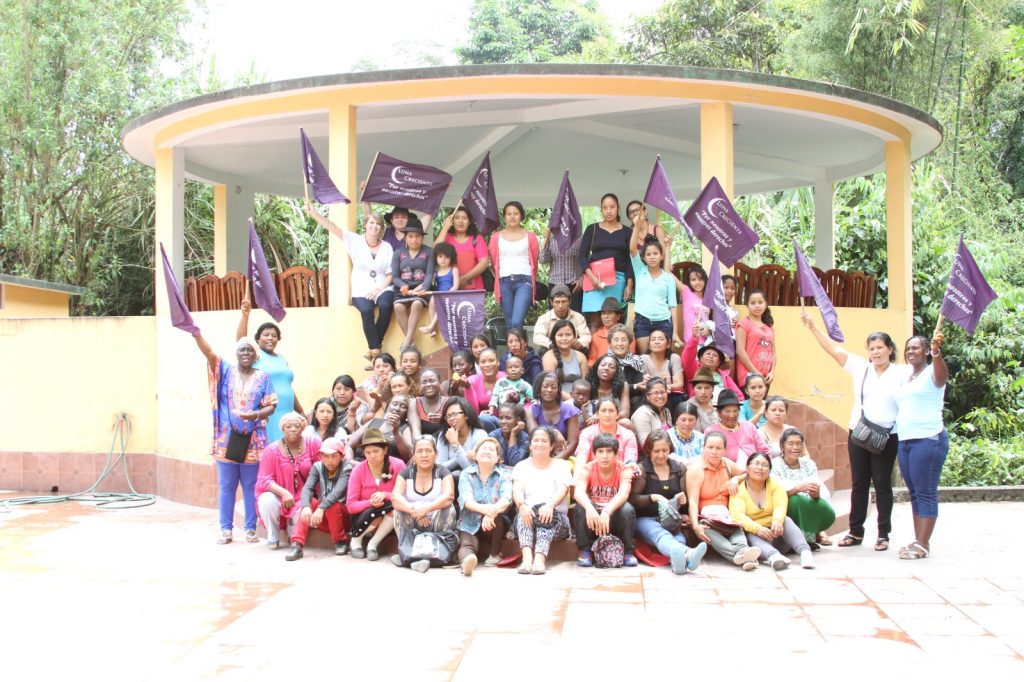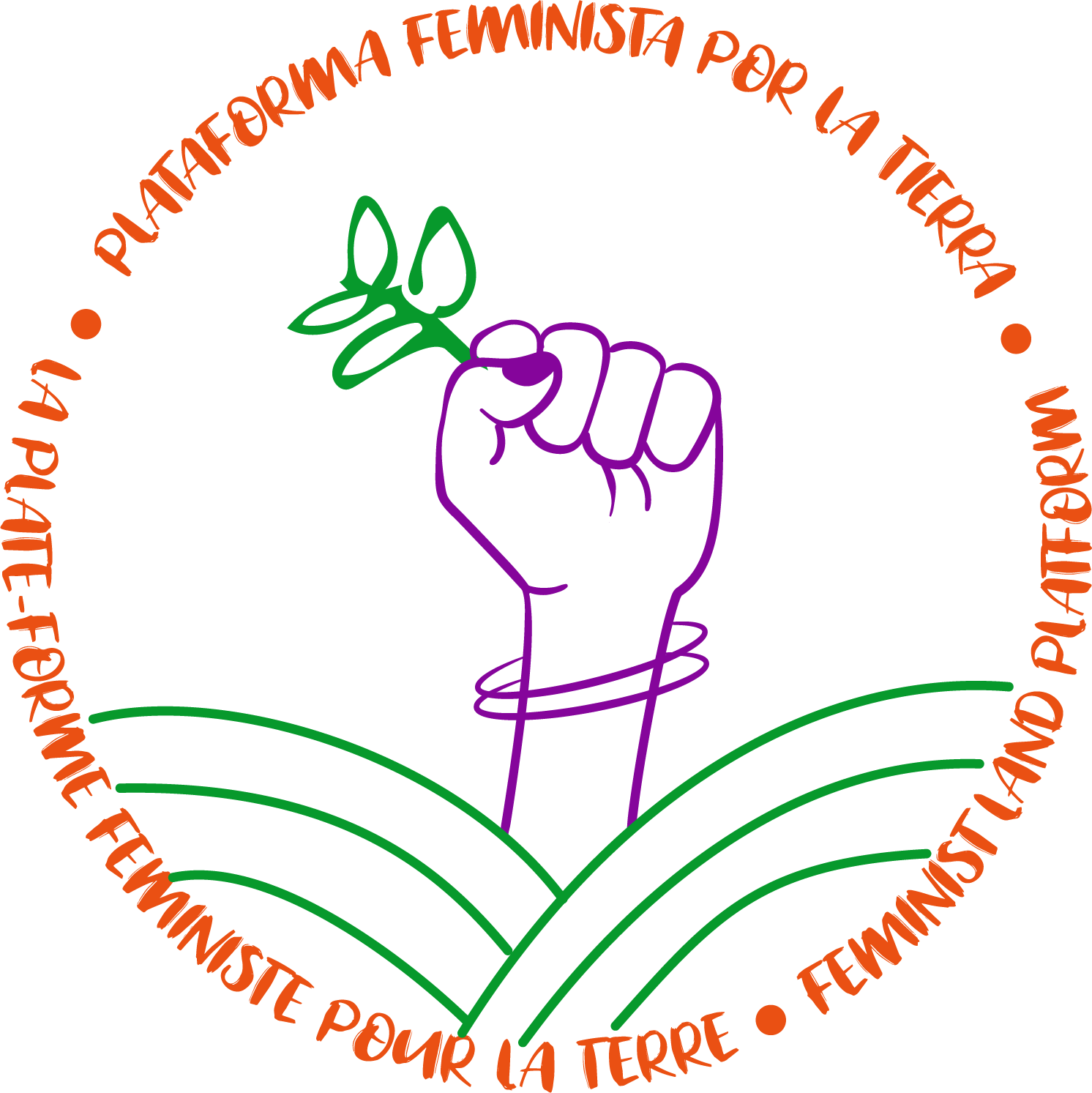Do you know the work of “Movimiento de Mujeres de Sectores Populares Luna Creciente,” our founding organization from Ecuador? We interviewed Clara Merino, the organization´s Executive Director who shared the history, main areas of intervention, and the strategies that Luna Creciente takes to overcome challenges. For more unformation, see also our article our article about the best resilience practices by Luna Creciente.

Can you briefly tell us about the history of the organization?
A group of organizations that work with impoverished sectors gather in Quito in the year 2000. They organize meetings, local and national encounters, exchanges and field visits. In 2004, the Movimiento de Mujeres de Sectores Populares comes to being with the support of Fundación de Mujeres Luna Creciente. They merge and become the same movement comprised of groups with a variety of different visions, actions, advocacy and constituencies.
In the process of 20 years, with the departure of some participants and the entry of others, the National Movement has consolidated its work, with a collective leadership, in 6 provinces of Ecuador: Pichicha, Cotopaxi, Loja, Esmeraldas, Sucumbíos and Morona Santiago. We unite 6 organizations that integrate 322 local organizations. Its members have a diversity of peoples/nationalities, geography (coast, highlands, Amazon); ways of life; number of members; age; sex/gender and advocacy.
This has been made possible by a permanent process of action-reflection-action sustained at the local, provincial and national levels and participation in broader regional and global spaces.
¿What are the main organizational working areas?
Considering the historical and current struggles of women’s organizations in their diversities, the main lines of action involve meetings, analysis and collective definitions in assemblies, exchanges, analysis and decisions of local diversities that co-create positions and actions from their local realities towards the national and global levels.
Though activities vary according to the local reality of organizations, the main areas of action include the following.
- Organizational strengthening and feminist political training within a permanent process, in national and local spaces to develop practices and actions that lead to the development of critical thinking with conceptual, methodological and political elements, from their own experiences and wisdom.
- Advocating personal and collective rights, with emphasis on women’s rights, peoples/nationalities, holistic health and defense of bodies, lands and territories, with key elements of action-reflection-action applicable to all levels.
- Protection of human rights, fundamentally of women and girls, with emphasis on economic, social, cultural and political rights.
- Nonmainstream communication and participatory research, with the integration of its own historical and local knowledge, for developing and expressing of concepts, codes and communicational forms for dissemination and analysis.
- Joint actions with indigenous, afro-descendants, popular organizations and movements that embrace values of feminist women organized in territories.
- Joint work with feminist coalitions and platforms that work for gender justice and climate justice.
Which are the main challenges Luna Creciente faces and how do you resist and organize among yourselves?
The main areas of work address the challenges we face. We highlight among them the growing level of impoverishment of the population, which affects women, youth, and children the most and it follows the logics of “necroliberalism” at national and global levels – with the exception of a few countries that remain resistant to it.
As a result, there are growing inequalities in terms of decent living conditions, serious violations of human and women’s rights, and the destruction of nature with the brutal advance of extractive activities, especially mining, oil and agro-industrial activities, with the destruction of the habitat of communities and peoples.
This reality leads to extreme situations, such as: i) increasing migration in inhumane and dangerous conditions that also takes to small agricultural production to be left in the hands of aging women; ii) increasing violence and declaration of a “state of internal war” with persecution and aggression against social movements, human rights and nature defenders; iii) lack of economic and subsistence resources for impoverished women, their organizations and the movements; iv) difficulties with connectivity and sources of communications, aggravated by power cuts.
In the face of serious challenges, the movement resists and acts on multiple fronts, practicing resilience as a political act, which includes the following.
We work at grassroots level with members of the organizations and their environments, with contributions mainly from unpaid community work and on very few occasions with small funds, increasingly scarce and decreasing, and minimal contributions from international cooperation.
We work on the permanent continuation of feminist political training and joint actions with other women’s and social organizations.
We intervene in various spaces dealing with precarious conditions both face-to-face and virtually, when possible, among the women of each community/organization, among them at the provincial level and among the members of the movement.
We attend permanently provincial and national meetings and assemblies, face-to-face whenever possible (less and less due to lack of funding) and virtual meeting according to connection availability.
We are committed to continuing with the feminist political trainings, participation in national and regional feminist events and in defense of the environment, support and contributions to public policies for social, gender, and climate justice.
We focus on unifying diversity going beyond electoral interests and on advocating in alliance with other feminists and social movements.
How does the Feminist Land Platform contribute to the work of Luna Creciente?
Being part of FLP has allowed us to enrichen our capacity to participate in political discussions and learn about the realities of organized impoverished women in the Global South – from their courageous fights to their strategic attempts.
This has connected us with feeling as part of the dreams and courageous fights of other women organizations in their territories and the collective attempts built at several global and regional spaces. Among which we highlight FLP´s Regional Encounter in Latin America and our presence at the powerful Marcha das Margaridas (March of Daisies) last year in Brazil.
We also place special significance to learning about the struggles of women organizations from Latin America, Africa, and Asia, which has improved our knowledge and understanding of the different realities as well as widen our vision of the international dimension and a more comprehensive perception of the struggles of our feminisms.
The spaces that the FLP have accomplished an important role have been key to our activities in defense of our individual and collective rights. It has also served to widen the scope and apply our advocacy addressing local, national and global issues.
As FLP members, we also participate in important interactive events at different levels, which brings us the opportunity to exchange experiences, thoughts, knowledge and dreams for better living conditions to ourselves and our villages. This has allowed us to disseminate all we learn in our exchanges with organizations in Ecuador.
Moreover, FLP has offered us support with seed grants in 2022 and 2023 to continue our feminist political trainings at local and national levels, regarding key issues such as gender and climate justice, an essential component of our work.

No comment yet, add your voice below!